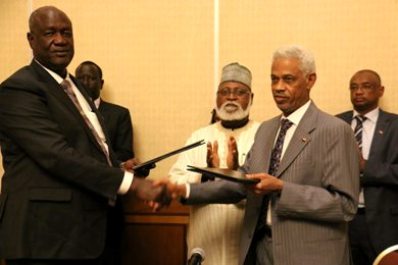Sudan, S. Sudan agree to fully activate buffer zone
September 25, 2018 (KHARTOUM) – Sudan and South Sudan on Monday have signed an agreement to take all necessary measures to activate the Safe Demilitarized Border Zone (SDBZ) between the two countries.

The two sides also agreed to activate the joint cooperation agreement signed in 2012, renewing commitment to work together to achieve security and stability in both countries.
In his address before the meeting, Mbeki praised the great role played by Sudan and President Omer al-Bashir to converge views of South Sudan parties, which led to the signing of the peace agreement in Khartoum.
For his part, the head of Sudan delegation to the meeting, Lt. Gen. Gamal al-Din Omer Ibrahim, reiterated his country’s full commitment to provide every possible support to sustain peace and stability in South Sudan.
On the other hand, South Sudan’s Defence Minister, First Liu. Gen. Kuol Manyang Juuk, pointed to the need to implement the cooperation agreement signed between the two countries.
He also thanked the Sudanese government and people for the role they played to achieve peace in his country.
In May 2017, the United Nations Security Council (UNSC) decided to reduce UNISFA troops and warned it may withdraw its support to the Sudan-South Sudan border monitoring force if they continue to impede the activation of the operation.
The buffer zone and other security arrangements have been agreed since September 2012 but its operationalization had been stopped despite several attempts by the AUHIP to encourage the parties to enforce the deal. The latest were two deals signed in October 2015 and June 2016.
In September 2012, both Sudan and South Sudan signed a series of cooperation agreements, which covered oil, citizenship rights, security issues, banking, border trade among others.
In March 2013, the two countries signed an implementation matrix for these cooperation agreements. However, the execution of the agreements didn’t go according to the plan.
South Sudan seceded from Sudan on July 9th, 2011 following a referendum on whether the semi-autonomous region should remain a part of the country or become independent. 99% of the southern voters chose independence.
(ST)
